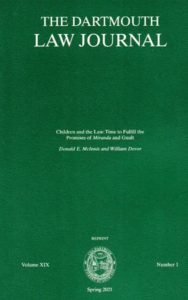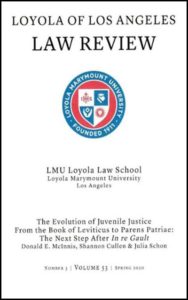 Children and the Law: Time to Fulfill the Promises of Miranda and Gault, , Esq., and The Dartmouth Law Journal, Volume 19, Issue 1, Spring Edition (2021).
Children and the Law: Time to Fulfill the Promises of Miranda and Gault, , Esq., and The Dartmouth Law Journal, Volume 19, Issue 1, Spring Edition (2021).
.
Introduction
This paper analyzes how legal rights guaranteed by the United States Constitution are continuously denied to children during police questioning. Research by neuroscientists, psychologists, sociologists, and others over the last fifty years shows that the lack of maturation of children’s brains makes them ill-equipped to protect themselves and their rights when questioned alone by police. This finding has proven that children — teenagers, in particular — inevitably waive their rights to remain silent and fail to ask for an attorney when questioned. Thus, there is an unusually high rate of false confessions, which result in children being subjected to juvenile court proceedings, or, worse, being tried and sentenced as adults. The authors propose new Miranda rights and a new Bill of Rights for Children as guides for future legislation to protect children when they are detained and questioned by authorities.
View and/or download: Children and the Law: Time to Fulfill the Promises of Miranda and Gault
 The Evolution of Juvenile Justice From the Book of Leviticus to Parens Patriae: The Next Step After In re Gault by Donald E. McInnis, Shannon Cullen & Julia Schon, Loyola of Los Angeles Law Review, Number 3, Volume 53, 553-585, Spring 2020.
The Evolution of Juvenile Justice From the Book of Leviticus to Parens Patriae: The Next Step After In re Gault by Donald E. McInnis, Shannon Cullen & Julia Schon, Loyola of Los Angeles Law Review, Number 3, Volume 53, 553-585, Spring 2020.
Abstract
Since the arrival of the Pilgrims, American jurisprudence has known that its law-breaking children must be treated differently than adults. How children are treated by the law raises ethical and constitutional issues. This Article questions the current approach, which applies adult due process protections to children who cannot fully understand their constitutional rights and the consequences of waiving those rights. The authors propose new Miranda warnings and a Bill of Rights for Children to protect children and their constitutional right to due process under the law.
View or Download – The Evolution of Juvenile Justice From the Book of Leviticus to Parens Patriae
 Money & Politics, Donald E. McInnis, Santa Clara University Law Review, Number 1, Volume 59, 2019, pages 69-105.
Money & Politics, Donald E. McInnis, Santa Clara University Law Review, Number 1, Volume 59, 2019, pages 69-105.
Abstract
The citizens’ initiative is a power reserved to the people as a check on our form of constitutional representative democracy. One, through citizens’ initiatives and referendums, the voters may propose laws and constitutional amendments or reject legislation passed by their elected representatives, and two, with most institutions of government, this form of direct democracy has evolved and is today a creature of its political environment. So powerful is the citizen’s initiative process that it has been called the fourth branch of government.
View and/or download: Money and Politics